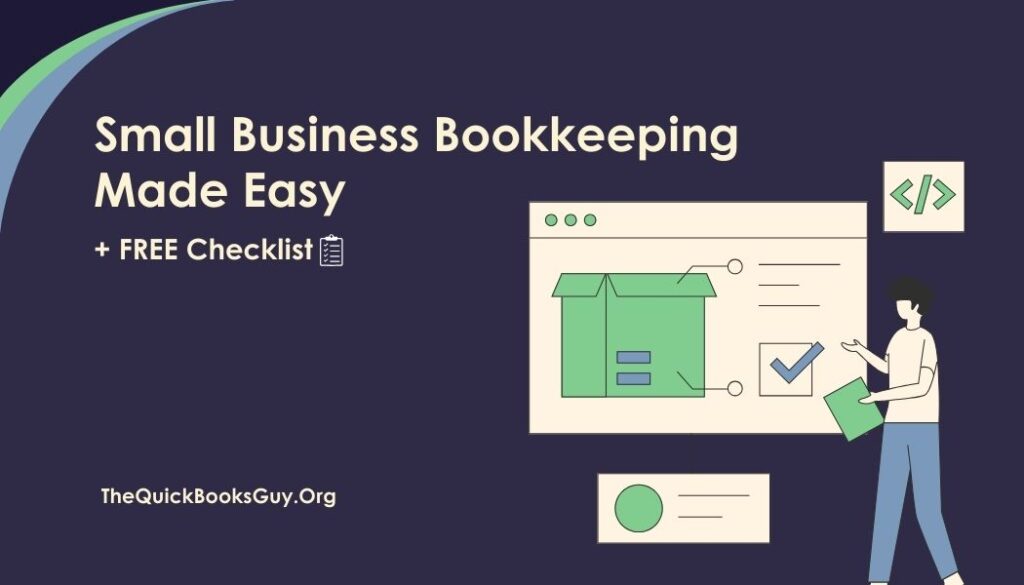
( Find your free checklist at the bottom of the page )
If you’re just starting out or looking to streamline your financial processes, doing your own bookkeeping might seem overwhelming. But with the right approach, it can be manageable—and even rewarding. In this post, we’ll walk you through the basics of small business bookkeeping, and at the end, we’ll introduce you to our free bookkeeping checklist that covers all your daily, weekly, monthly, and quarterly tasks to help you stay organized and on top of your finances.
Good luck in all your bookkeeping endeavors!
Why Bookkeeping Matters
Before diving into the how-tos, let’s briefly discuss why bookkeeping is so important for your small business:
- Financial Clarity: Bookkeeping gives you a clear picture of your financial health, helping you understand where your money is coming from and where it’s going. This clarity allows you to make informed decisions about budgeting, investments, and growth strategies.
- Tax Compliance: Accurate bookkeeping ensures that your financial records are in order when it’s time to file taxes. This not only helps you avoid penalties but also makes it easier to identify deductions and credits that can save you money.
- Cash Flow Management: Keeping track of your income and expenses helps you monitor your cash flow, ensuring that you have enough liquidity to cover operational costs and invest in your business.
- Business Growth: Well-maintained books allow you to analyze your financial performance over time, identify trends, and make strategic decisions that drive growth.
Getting Started with Small Business Bookkeeping
Now that you understand the importance of bookkeeping, let’s look at how you can do it yourself.
1. Choose a Bookkeeping System
The first step in bookkeeping is deciding how you will record your financial transactions. You have two main options:
- Manual Bookkeeping: This involves recording transactions by hand, either in a physical ledger or using spreadsheets. While this method is low-cost, it can be time-consuming and prone to errors.
- Digital Bookkeeping: Most small businesses use accounting software like QuickBooks. QuickBooks automates many bookkeeping tasks, such as categorizing transactions, generating financial reports, and reconciling accounts, making the process faster and more accurate.
TIP: Use our link to unlock 30% off QuickBooks for 6 months – that’s 20% more than the standard QuickBooks website discount when you sign up using our link!
2. Set Up Your Chart of Accounts
A chart of accounts is a list of all the financial accounts in your business, organized into categories like assets, liabilities, income, and expenses. Setting up a chart of accounts tailored to your business needs is crucial for keeping your books organized and making it easy to track your financial performance.
3. Record Transactions Regularly
Once your chart of accounts is set up, it’s time to start recording transactions. This includes any money that comes into or goes out of your business, such as sales, purchases, payroll, and loan payments. It’s essential to record transactions promptly to avoid errors and keep your books up to date.
4. Reconcile Your Accounts
Reconciling involves comparing your bookkeeping records with your bank statements to ensure they match. This process helps you catch discrepancies, such as missed transactions or incorrect entries, and ensures your books are accurate.
5. Generate Financial Reports
Regular financial reports, such as profit and loss statements, balance sheets, and cash flow statements, are critical for understanding your business’s financial health. Most accounting software can generate these reports automatically, giving you valuable insights into your business’s performance.
The Bookkeeping Checklist: Your Key to Staying Organized
We’ve created a checklist by breaking down daily, weekly, monthly, and quarterly tasks into manageable steps. We’re committed to helping you stay organized and confident in your financial management.
Download Your Free Bookkeeping Checklist Now!
Not ready to do it on your own
The QuickBooks Guy offers not just bookkeeping services but a partnership in your financial journey. With a deep understanding of QuickBooks and a commitment to personalized service, ‘The QuickBooks Guy’ is your ally in navigating the complexities of financial management. By choosing us, you ensure that your business’s financial health is in capable hands, allowing you to focus on growing your business.
Don’t let bookkeeping challenges hold you back any longer. Reach out today at 678-923-5904 or drop an email to TheQuickBooksGuy@gmail.com.




